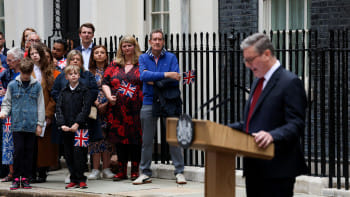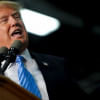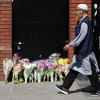The UK has always had an Islamophobia problem

The UK has been embroiled in racist violence as members of the far-right assert that the nation is under threat from Islam, migrants and racial "others." Chants such as "we want our country back" and "send them home" reverberate through the streets as chaos descends; hotels housing asylum seekers, mosques, shops, public infrastructure and people perceived to be Muslim are being attacked. Amongst Muslims and other marginalised communities, pleas to be vigilant are anxiously repeated and safety tips are urgently shared: don't go out alone, don't wear noise cancelling headphones, don't stand too close to the edge of the road or train tracks, wear your hijab loose with no pins—and advice on what to do in the event of an acid attack.Whilst all of this is horrific and alarming, it is not wholly unexpected.
On July 29, three children were stabbed to death in Southport, England. What should have been a period of national mourning was overshadowed by racist and Islamophobic violence as far-right figureheads such as Tommy Robinson, the founder of the now defunct English Defence League, and Nigel Farage, MP and leader of Reform UK, propagated the false narrative that the Southport attacker was a Muslim immigrant. Even after the attacker was revealed to be a 17-year-old British national named Axel Rudakubana—who was born in Cardiff and is reportedly a Christian—riots continued to erupt. In response to this, the British establishment is placing the sole blame on "far-right thuggery." Although the far-right should be held accountable, solely making it about them obscures the fact that this violence did not emerge from a vacuum. Far-right groups are emboldened in a political landscape in which Islamophobia, racism and anti-migrant discourse is not only normalised, it is embedded in the fabric of the imperialist nation.
Whilst Palestine solidarity protests were labelled as "hate marches," mainstream media outlets describe the violent rioters as "anti-immigration" and "pro-British protestors" who are causing "disorder." It is important to remember that racial violence is the order of things in Britain. In fact, anti-migrant rhetoric pervaded the recent general election as the Conservatives, Labour Party and Reform UK emphatically promised to "stop the boats." From its genesis in the corridors of power, "stop the boats" became a slogan for far-right fascists as they terrorised the country. Although anti-racists prevented the far-right from attacking a hotel housing asylum seekers in Bristol, hotels in Leeds, Rotherham and Tamworth saw break ins, smashed windows, petrol bombs and attempts to set the buildings on fire. Days earlier, Labour MP Sarah Edwards highlighted the hotel in Tamworth and told Parliament that "residents want their hotel back," effectively placing a target on the hotel and endangering the lives of its residents.
The run up to the election also saw Labour party leader Keir Starmer—now the prime minister of the UK—criticise the Conservative government for not deporting Bangladeshi migrants, amongst others. This scapegoating of migrant communities is not new; instead of addressing government failures and institutionalised structures of inequality which uphold the hegemony of the economically powerful, migrant communities are forced to bear the blame for the lack of housing, employment shortages and the depletion of NHS resources. Conveniently, selective colonial amnesia deflects the UK's pivotal role in injustices across the globe. Colonial strategies such as divide and conquer, proxy wars, destabilising regions and installing dictators create the conditions for vulnerability, displacement and forced migration.
Islamophobia is a tool of coloniality which operates through dehumanisation and is utilised to push political agendas. The beneficiaries of the "War on Terror" fuelled the narrative that mosques in the West are breeding grounds for terrorism imported from foreign lands. This narrative prevails today, placing suspicion on mosques and framing Muslims as alien intruders. It is not surprising then that the first riot culminated in the attack of Southport Mosque, amidst a cacophony of Islamophic chants and left worshippers fearful for their lives.
And yet, pro-establishment journalists and politicians, including the prime minister, are reluctant (or rather, refuse) to use the term Islamophobia when describing the violence. On a Good Morning Britain appearance, MP Zarah Sultana highlighted the role of institutional Islamophobia in instigating the riots and was met with patronising derision by Ed Balls, a former Labour politician and husband of the current Home Secretary. In light of a recent Muslim Census survey, this gaslighting becomes even more sinister: the survey found that 92 percent of Muslims said they felt less safe living in the UK following the recent riots, and one in six British Muslims have personally experienced an Islamophobic or racist incident in the past week.
Islamophobia has been termed "the dinner table prejudice," highlighting just how prevalent and socially acceptable it is within British society. However, as Simon Perfect rightly points out, "If Islamophobia is to be kicked off the dinner table, it's got to be kicked off the Downing Street Cabinet table first." Institutional Islamophobia is alive and kicking. As Islamophobic fascist riots were raging, Conservative MP and leadership candidate, Robert Jenrick, stated that police should immediately arrest activists shouting "Allahu Akbar" (God is great) at protests. In advocating for criminalising this proclamation of faith, Jenrick wrote over the phrase's spiritual significance with a prejudiced political agenda. By adding fuel to the flames of Islamophobia, Jenrick no doubt gave ammunition to far-right fascists. But what can we expect from a man who ordered cartoon murals to be painted over at a unit for unaccompanied child asylum seekers because they were "too welcoming"?
The British establishment has incited far-right fascist riots through the steady vilification of Muslims and migrants who are rendered simultaneously invisible and hypervisible. Invisible through dehumanisation and the refusal of their intrinsic value and claims to belonging, and hypervisible as a constructed threat to the nation. This rings true on both a domestic and foreign policy level as we can see through the UK's complicity in the Gaza genocide—one example of the nation's entanglement in structures of oppression and white supremacy.
On August 7, planned riots were set to ravage the nation and whilst violence did erupt, the rioters were largely outnumbered by people who came out in droves to stand against racism and hatred. Many held Palestine flags, acknowledging the interconnectedness of liberation struggles. However, according to journalist Owen Jones, the ruling Labour party ordered its MPs not to attend "anti-fascist demonstrations." At a time when it is more important than ever to take a firm and unyielding stance against fascism, the political class continue to enable it.
Mariam Sidat has a Masters in Postcolonial Studies and is currently an intern at Educate Against Islamophobia.
Views expressed in this article are the author's own and do not reflect those of any organisation, institution, or entity with which she is associated.
Follow The Daily Star Opinion on Facebook for the latest opinions, commentaries and analyses by experts and professionals. To contribute your article or letter to The Daily Star Opinion, see our guidelines for submission.

 For all latest news, follow The Daily Star's Google News channel.
For all latest news, follow The Daily Star's Google News channel. 









Comments